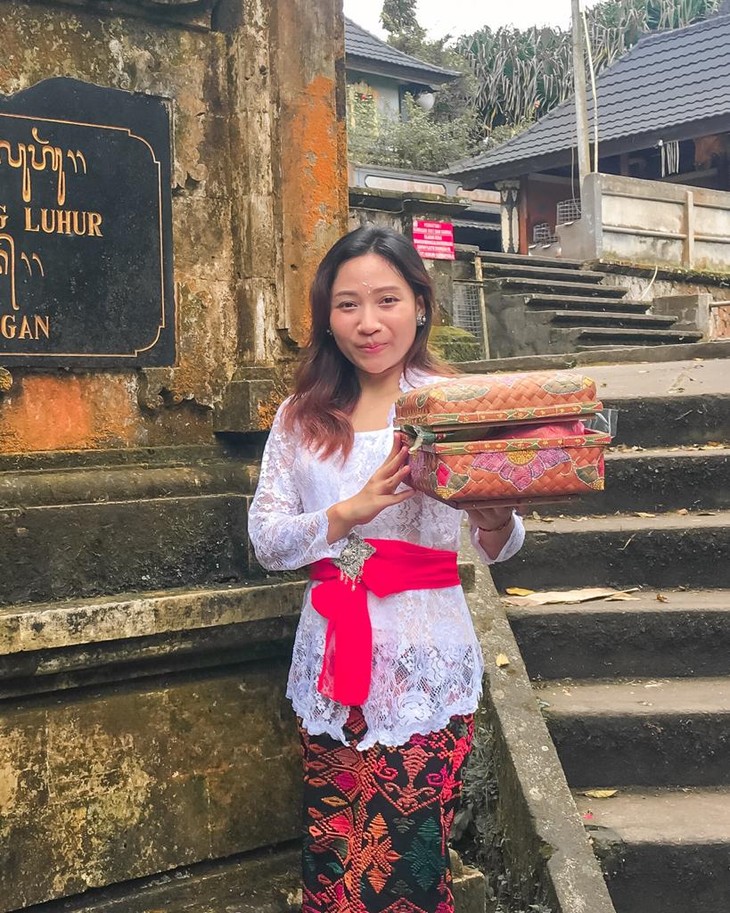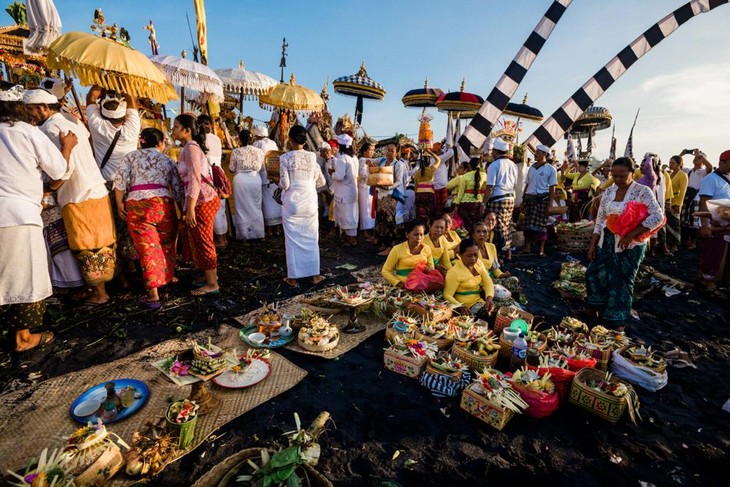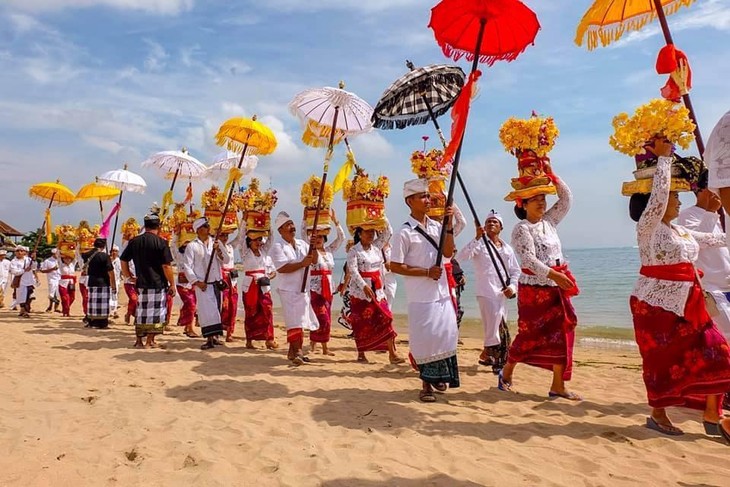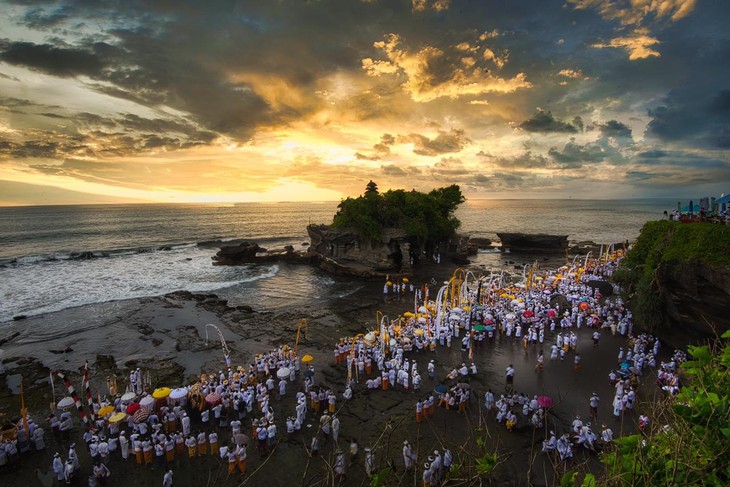(VOVWORLD) - Once a year, the island of Bali completely shuts down for one day. This day, known as Nyepi, is unique to Bali and marks the first day of the New Year according to the Saka Balinese calendar. In today’s program, we’ll invite Made Vera, a Balinese graphic designer and lecturer of Institut Desain dan Bisnis Bali to tell us more about this most important Balinese holiday.
 Made Vera in her Balinese traditional attire. Made Vera in her Balinese traditional attire. |
Ngoc Diep: Welcome to VOV24/7. Thank you for joining us today, Made Vera. Bali is famous for its beautiful nature and many special traditions, including Nyepi. Why is this New Year celebration so unique?
Made Vera: Thank you too, for having me today. Nyepi is the most important and sacred Hindu holiday on Bali, and is a general public holiday in the rest of Indonesia. We can say this holiday is unique because contrary to other cultures all around the world, who celebrate the New Year with dynamic and sparkling festivities, Nyepi or the Balinese Saka New Year celebration is a day dedicated to complete silence. As a year on the Saka Balinese calendar is 420 days, Nyepi falls on a different date each year, and this year, Nyepi falls on the 14th of March.
Ngoc Diep: So what happens on this day?
Made Vera: It's ultimately the quietest day of the year – all of the island's inhabitants abide by a set of local rules that bring routine activities to a complete halt.
Observed from 6 a.m. until 6 a.m. the next morning, Nyepi is a day reserved for self-reflection, and as such, anything that might interfere with that purpose is restricted. The main restrictions are no lighting fires (and lights must be kept low); no working; no entertainment or pleasure; no traveling; and, for some, no talking or eating at all.
The effect of these prohibitions is that Bali's usually bustling streets and roads are empty, there is little or no noise from TVs and radios, limited access to Internet and few signs of activity are seen even inside homes. The only people to be seen outdoors are the Pecalang, traditional security men who patrol the streets to ensure the prohibitions are being followed.
 The procession of Melasti taken in 2019 before the COVID-19 pandemic. (Photo: Dewa Ode) The procession of Melasti taken in 2019 before the COVID-19 pandemic. (Photo: Dewa Ode) |
Ngoc Diep: As Nyepi marks the beginning of the Balinese Saka New Year, do the Balinese have any New Year celebrations before and after this special day?
Made Vera: Of course we do. The days leading up to Nyepi are an extremely busy period for the Balinese, with a number of ceremonies that must be performed for purification, and to ensure good luck and fortune for the year ahead.
Ngoc Diep: So what are the ceremonies?
Made Vera: Well, Melasti is the first major ceremony, usually three or four days before Nyepi. The Melasti ceremony is always held on a beach, and entire villages make a pilgrimage to their closest beach to perform a purification ritual. Everyone wears atraditional white dress called an adat.
On Saka New Year’s Eve, everywhere is filled with blaring noise and merriment. Every Balinese household starts the evening with blessings at the family temple and continues with a ritual called the pengrupukan, where each member participates in ‘chasing away’ malevolent forces (bhuta kala) from their compounds. Pots and pans, or any other loud instruments, are struck repeatedly together with a fiery bamboo torch.
The night before Nyepi is possibly the most exciting and spectacular time to be on the island, as each village will hold its own Ngrupuk parade with Ogoh-ogoh in order to draw out and banish malevolent spirits.
 The Melasti procession. (Photo: Dewa Ode) The Melasti procession. (Photo: Dewa Ode) |
Ngoc Diep: The Ngrupuk parade with Ogoh-ogoh sounds intriguing! Can you talk a bit more about it?
Made Vera: Sure. The Ogoh-ogoh are large statues made from bamboo and paper, mostly representing monsters from Hindu mythology. They’re made by the young men in each village for months beforehand and paraded down the main street of each village as night falls, often headed-up by the young women of the village, carrying flaming torches.
At several points in the procession, the ogoh ogoh are spun around three times in order to confuse the spirits. At the end of the parade, the effigies are ritually burned, although this practice is becoming less common in recent years.
The Ogoh-ogoh parade is always accompanied by traditional high-energy music provided by the Baleganjur gamelan – a marching band of drums and gongs that also can be heard at ceremonial processions.
Made Vera: If you’re visiting Bali over Nyepi, you’re incredibly lucky to have the chance to witness this spectacle. Hotels and Resorts operate as usual and you’ll be able to explore the grounds and use the swimming pool. Restaurants inside large hotels will also remain open but if you’re staying in a small homestay or self-catering villa, you’ll need to make sure you have enough food and provisions in 24 hours.
On Nyepi eve, the Ogoh-ogoh processions will start around sunset. Most villages display the Ogoh-ogoh on the community football field or a designated road from the morning, so you’ll have the opportunity to see them in close-up and get some good photos. But unfortunately, because of the Covid-19 pandemic, this year the Ogoh-ogoh parade is not allowed by the local government to limit the mass crowd.
Ngoc Diep: What a pity!
Made Vera: Yes. But wherever you are in Bali for Nyepi, and whether you use the day for relaxation and indulgence, or introspection and meditation, remember to step outside and take a look at those incredible stars before you turn in for the night. It’s a sight and experience you’re sure to remember forever.
Ngoc Diep: Fantastic. I really hope when the COVID-19 pandemic is over, I’ll have a chance to visit Bali during Nyepi. Thank you so much for sharing with us about Nyepi, the most sacred Hindu holiday in Bali. Wishing you all the best in work and life.
Made Vera: Thank you, too, VOV24/7, for having me today.
 The Melasti procession of 2016 Nyepi. (Photo: Dewa Ode) The Melasti procession of 2016 Nyepi. (Photo: Dewa Ode) |